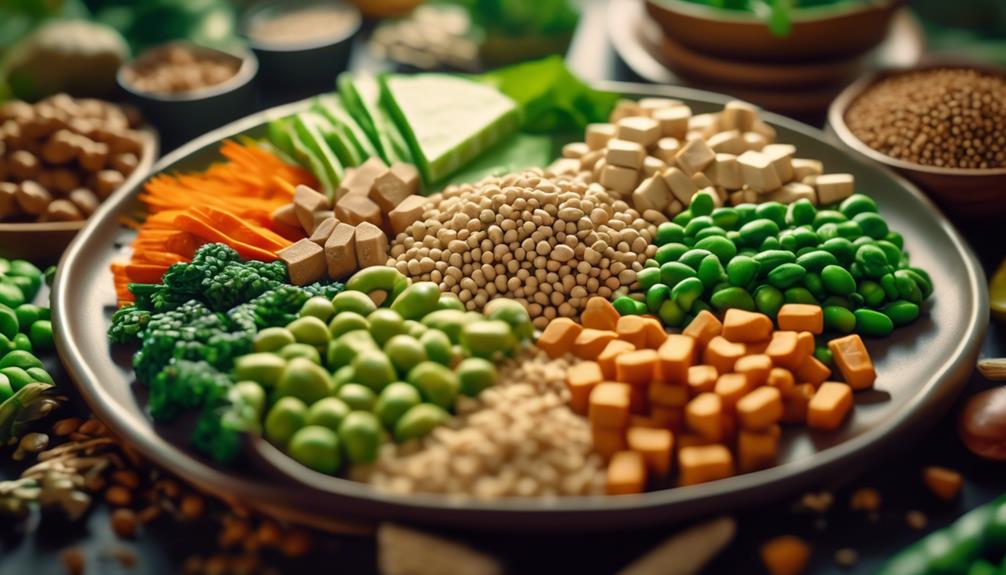So, you've decided to embark on the journey of a vegetarian on a keto diet. You're probably wondering, what are the best plant-based protein sources to fuel your body? Well, fear not, because we've got you covered.
In this discussion, we will explore some of the top contenders in the world of vegetarian keto protein. But be warned, the answer may not be as straightforward as you think.
So, get ready to discover a whole new world of plant-based protein options that will leave you satisfied and eager to explore further.
Tofu

Tofu is a versatile and nutritious plant-based protein source commonly used in vegetarian keto diets. Packed with essential amino acids, tofu provides a complete protein profile that's crucial for muscle growth and repair. It's also low in carbohydrates, making it an excellent choice for those following a keto diet.
One of the benefits of incorporating tofu into your diet is its ability to support weight loss. Tofu is low in calories and fat, yet it's still satisfying and filling. This can help you feel satiated while reducing your overall calorie intake.
Additionally, tofu is rich in minerals such as calcium, iron, and magnesium, which are essential for maintaining strong bones and supporting various bodily functions. It's also a good source of antioxidants, which can help protect against oxidative stress and inflammation.
When it comes to preparing tofu, the possibilities are endless. You can use it as a substitute for meat in stir-fries, salads, and sandwiches. You can also experiment with different tofu recipes, such as tofu scrambles, tofu stir-fries, or even tofu-based desserts.
Tempeh
As you explore more plant-based protein options for your vegetarian keto diet, another excellent choice to consider is tempeh. Tempeh is a fermented soy product that isn't only rich in protein but also packed with essential nutrients.
Here are three reasons why tempeh should be on your list of go-to protein sources:
- High in protein: Tempeh is a complete protein, meaning it contains all the essential amino acids your body needs. In fact, a 3-ounce serving of tempeh provides around 16 grams of protein, making it an excellent choice for meeting your daily protein requirements.
- Gut-friendly: The fermentation process involved in making tempeh enhances its digestibility and increases the bioavailability of nutrients. It's also a great source of probiotics, which can promote a healthy gut microbiome and improve digestion.
- Versatile and delicious: Tempeh can be used in a variety of dishes, making it a versatile ingredient for your vegetarian keto recipes. Whether you marinate it, grill it, or crumble it as a ground meat substitute, tempeh adds a unique nutty flavor and satisfying texture to your meals.
Incorporating tempeh into your vegetarian keto diet can provide you with a nutrient-dense protein source that offers numerous health benefits. Try out different tempeh recipes and experience the deliciousness and versatility this plant-based protein has to offer.
Seitan
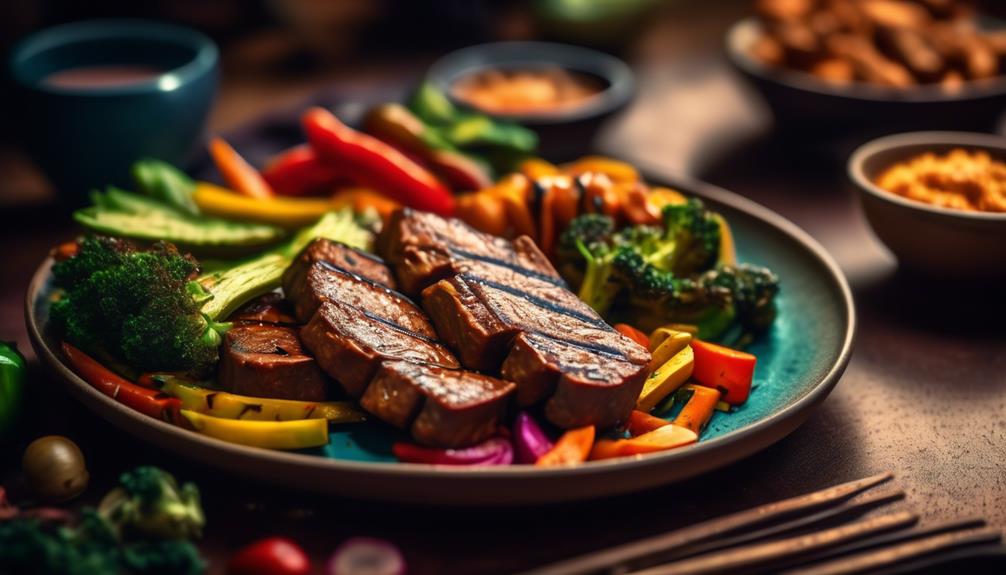
Seitan, also known as wheat meat or wheat gluten, is a plant-based protein that offers numerous benefits and uses. It's a great source of protein for vegetarians following a keto diet, as it's low in carbs and high in protein.
In comparison to other plant-based proteins, seitan has a chewy texture and can be used as a meat substitute in various dishes.
Seitan Benefits and Uses
When following a vegetarian keto diet, incorporating seitan into your meals can provide numerous benefits and versatile uses. Here are three reasons why seitan is a great addition to your diet:
- High in protein: Seitan is made from wheat gluten, which is rich in protein. It contains all the essential amino acids, making it a complete protein source. Adding seitan to your meals can help meet your protein needs and support muscle growth and repair.
- Low in carbs: Compared to other plant-based protein sources like beans or lentils, seitan is lower in carbohydrates. This makes it a suitable choice for those following a low-carb or keto diet.
- Versatile in recipes: Seitan has a chewy and meaty texture, making it a popular meat substitute in vegetarian and vegan dishes. You can use seitan in stir-fries, stews, sandwiches, or even as a pizza topping. Its neutral flavor allows it to absorb the flavors of your favorite seasonings and sauces.
Seitan Vs. Other Plant-Based Proteins
In comparison to other plant-based proteins, seitan offers unique advantages due to its high protein content, low carbohydrate profile, and versatile culinary applications.
When it comes to comparing seitan with tofu, seitan takes the lead in terms of protein content. Seitan is made from wheat gluten, which is almost pure protein, while tofu is made from soybeans and contains a lower protein content. Additionally, seitan has a lower carbohydrate profile, making it a suitable option for those following a low-carb or ketogenic diet. On the other hand, tofu contains more carbohydrates.
Another plant-based protein, tempeh, also has its benefits, such as being a good source of fiber and containing probiotics. However, seitan still stands out with its high protein content, making it a preferred choice for those seeking a protein-rich, low-carb option.
Easy Seitan Recipes
Discover delicious and easy-to-make recipes that showcase the versatility of seitan as a plant-based protein option.
Seitan, also known as wheat meat or wheat gluten, is made from gluten, the protein found in wheat. It has gained popularity among vegetarians and vegans for its meat-like texture and high protein content.
Here are three variations of seitan recipes that you can try:
- Seitan Stir-Fry: Slice seitan into thin strips and stir-fry it with your favorite vegetables and seasonings for a quick and nutritious meal.
- BBQ Seitan Skewers: Marinate seitan in a smoky barbecue sauce, thread it onto skewers with vegetables, and grill for a flavorful and protein-packed dish.
- Seitan Curry: Add seitan to a fragrant curry sauce with coconut milk, vegetables, and spices for a hearty and satisfying meal.
In addition to being a great source of protein, seitan is also low in fat and cholesterol-free, making it a healthy choice for those following a plant-based diet.
Lentils
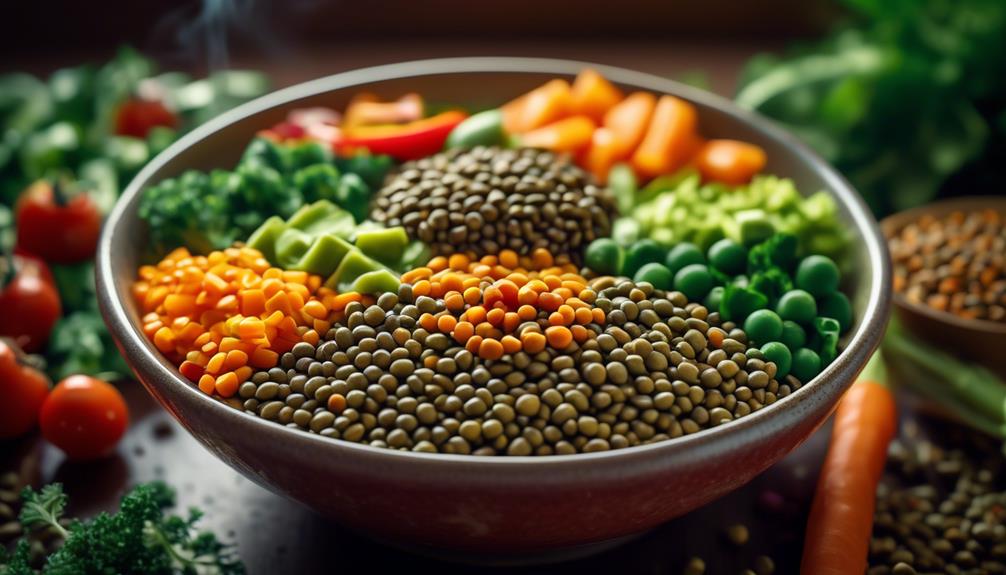
Lentils are a versatile and nutritious plant-based protein source that can be incorporated into a vegetarian keto diet. They offer numerous health benefits and are a great alternative to animal-based proteins. Lentils are low in calories and carbohydrates, making them suitable for a keto diet.
One of the benefits of lentils is their high protein content. They're an excellent source of plant-based protein, containing around 18 grams of protein per cooked cup. Protein is essential for muscle repair and growth, and it also helps to keep you feeling full and satisfied.
In addition to protein, lentils are rich in fiber, which aids in digestion and supports a healthy digestive system. They also provide a good amount of iron, which is important for carrying oxygen throughout the body and preventing iron deficiency anemia.
When comparing lentils to seitan and tofu, lentils have the advantage of being naturally gluten-free, making them suitable for individuals with gluten sensitivities or celiac disease. Lentils also have a lower calorie and carbohydrate content compared to seitan, making them a better choice for those following a keto diet.
Incorporating lentils into your vegetarian keto diet can be easy and delicious. They can be used in soups, stews, salads, or even as a substitute for meat in various recipes. Consider adding lentils to your meal plan to enjoy their nutritional benefits and enhance your vegetarian keto journey.
Chickpeas
Chickpeas are a nutritious and versatile plant-based protein source that can be beneficial for those following a vegetarian keto diet. They're rich in protein, fiber, and various vitamins and minerals, making them a great addition to your meals.
Incorporating chickpeas into your diet can be as simple as adding them to salads, soups, or making hummus for a tasty and filling option.
Nutritional Profile of Chickpeas
Did you know that chickpeas aren't only delicious but also packed with essential nutrients? Here are three reasons why chickpeas should be a staple in your diet:
- High in protein: Chickpeas are an excellent plant-based protein source, making them perfect for vegetarians and vegans. With about 15 grams of protein per cup, chickpeas can help you meet your daily protein needs.
- Rich in fiber: Fiber is important for maintaining a healthy digestive system and promoting feelings of fullness. Chickpeas are loaded with fiber, with about 12 grams per cup. This can aid in weight management and prevent overeating.
- Nutrient-dense: In addition to protein and fiber, chickpeas are also packed with essential vitamins and minerals. They're a good source of iron, magnesium, potassium, and folate. These nutrients play vital roles in maintaining overall health and well-being.
Incorporating chickpeas into your diet can be as simple as adding them to salads, soups, or making delicious chickpea-based recipes like hummus or falafels. By doing so, you can enjoy the many health benefits that chickpeas offer.
Benefits of Chickpeas
With their impressive nutritional profile, incorporating chickpeas into your diet can provide you with a range of health benefits.
Chickpeas are rich in protein, fiber, vitamins, and minerals, making them an excellent addition to any plant-based diet.
One of the key benefits of chickpeas is their ability to support weight management. Their high fiber content helps you feel fuller for longer, reducing cravings and aiding in weight loss.
Additionally, chickpeas are packed with antioxidants, which play a crucial role in reducing inflammation and protecting against chronic diseases.
Furthermore, these versatile legumes are known to promote digestive health due to their fiber content, supporting regular bowel movements and preventing constipation.
Despite their numerous benefits, it's important to note that chickpeas may cause bloating and gas in some individuals.
To enjoy the benefits of chickpeas, try incorporating them into your diet through delicious chickpea recipes like hummus, salads, and curries.
Ways to Incorporate Chickpeas
To incorporate the nutritional benefits of chickpeas into your diet, consider trying out various delicious recipes that feature these versatile legumes. Chickpeas aren't only a great source of plant-based protein but also provide essential nutrients such as fiber, iron, and folate. Here are three ways you can incorporate chickpeas into your meals:
- Chickpea Salad: Make a refreshing salad by combining cooked chickpeas with diced vegetables like tomatoes, cucumbers, and bell peppers. Add some lemon juice, olive oil, salt, and pepper for a simple yet satisfying meal.
- Roasted Chickpeas: Roasted chickpeas make a crispy and nutritious snack. Toss cooked chickpeas in olive oil and your favorite spices, such as cumin or paprika, then bake until crispy. Enjoy them on their own or as a topping for salads and soups.
- Chickpea Curry: Create a flavorful curry by simmering chickpeas with spices like turmeric, cumin, and coriander. Add coconut milk and vegetables like spinach or cauliflower for a hearty and wholesome meal.
Incorporating chickpeas into your diet through these delicious recipes won't only add variety to your meals but also provide you with the numerous nutritional benefits they offer.
Quinoa
Quinoa is a versatile and nutrient-dense grain that can be a valuable source of plant-based protein for those following a vegetarian keto diet. Not only is quinoa high in protein, but it also contains all nine essential amino acids, making it a complete protein source. This makes quinoa a great option for vegetarians and vegans who may struggle to meet their protein needs.
Quinoa is also rich in other important nutrients. It's a good source of fiber, which can help with digestion and maintaining a healthy weight. It's also high in several minerals, including magnesium, iron, and zinc. These minerals are essential for various bodily functions, such as immune system support and energy production.
When it comes to incorporating quinoa into a vegetarian keto diet, there are plenty of delicious recipes to try. You can use quinoa as a base for salads, add it to stir-fries, or use it as a substitute for rice or pasta in dishes like quinoa pilaf or quinoa spaghetti.
Hemp Seeds
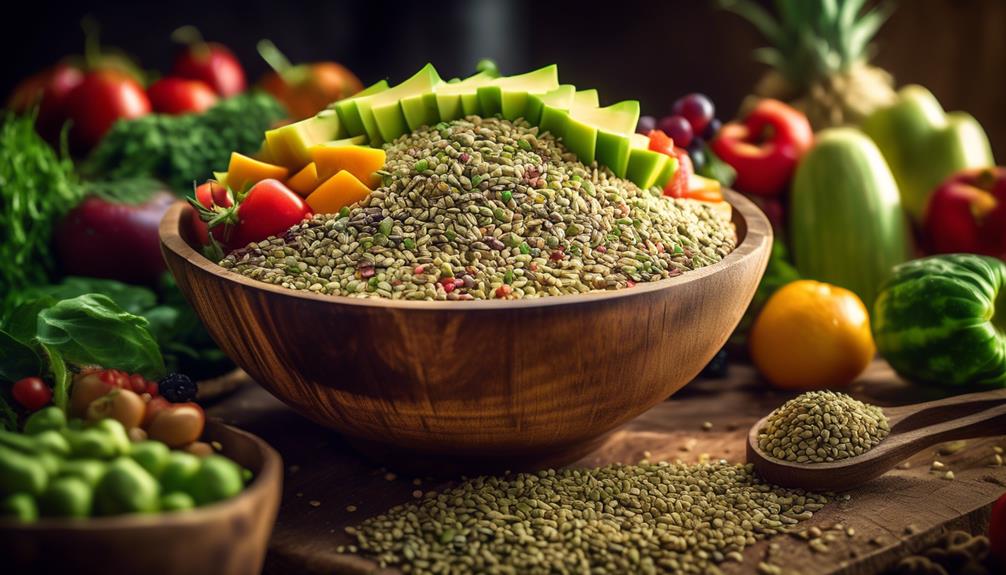
If you're looking for another plant-based protein source to add to your vegetarian keto diet, consider incorporating hemp seeds. Hemp seeds are a great addition to your meals because they're packed with nutrients and provide a good amount of protein.
Here are three reasons why you should consider adding hemp seeds to your vegetarian keto diet:
- High protein content: Hemp seeds are a great source of plant-based protein. Just three tablespoons of hemp seeds contain around 9 grams of protein, making them an excellent choice for those following a vegetarian keto diet. Protein is essential for building and repairing tissues, and it also helps to keep you feeling full and satisfied.
- Healthy fats: Hemp seeds are rich in healthy fats, particularly omega-3 fatty acids. These fats are important for brain health and can also help reduce inflammation in the body. Including hemp seeds in your diet can help ensure you're getting a good balance of fats in your vegetarian keto eating plan.
- Versatility: Hemp seeds are incredibly versatile and can be incorporated into a variety of dishes. You can sprinkle them on salads, add them to smoothies, or use them as a topping for your favorite keto-friendly desserts. Their mild nutty flavor makes them a delicious addition to any meal.
Chia Seeds
Chia seeds are a nutritious addition to your vegetarian keto diet, providing a wealth of health benefits. These tiny seeds are packed with essential nutrients and can be an excellent source of plant-based protein for those following a keto lifestyle.
Chia seeds are low in carbohydrates and high in fiber, making them a suitable option for maintaining ketosis. One of the main benefits of chia seeds for keto is their high protein content. With about 5 grams of protein per ounce, chia seeds can contribute to your daily protein intake while keeping your carbohydrate intake low. Protein is essential for building and repairing tissues, supporting muscle growth, and maintaining overall health.
Additionally, chia seeds are rich in omega-3 fatty acids, which play a crucial role in reducing inflammation and supporting heart health. These healthy fats are essential for a well-rounded keto diet. Chia seeds also contain a good amount of fiber, which can aid in digestion and help you feel full for longer periods.
Incorporating chia seeds into your vegetarian keto diet is simple. You can sprinkle them on salads, add them to smoothies, or use them as a topping for yogurt or oatmeal. However, it's important to note that chia seeds do absorb liquid, so it's recommended to soak them before consuming to prevent any digestive discomfort.
Almonds
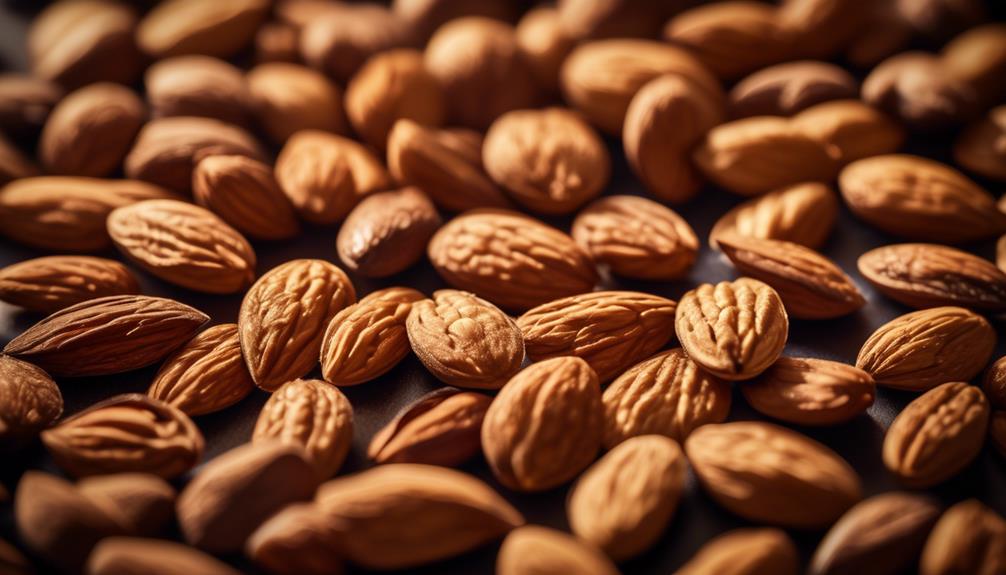
To continue your exploration of plant-based protein sources for your vegetarian keto diet, let's now turn our attention to almonds.
Almonds aren't only a delicious snack but also a great addition to your keto recipes. Here are three reasons why you should consider incorporating almonds into your diet:
- High protein content: Almonds are a fantastic source of plant-based protein, containing about 6 grams of protein per ounce. This makes them an excellent choice for meeting your protein needs on a vegetarian keto diet, where you may be limited in animal protein options.
- Healthy fats: Almonds are rich in healthy fats, such as monounsaturated fats and omega-3 fatty acids, which are essential for maintaining optimal health. These fats not only provide satiety but also support heart health and brain function.
- Versatile ingredient: Almonds can be easily incorporated into a variety of keto recipes. You can enjoy them as a crunchy topping for salads or roasted as a snack. You can also use almond flour as a low-carb alternative to traditional flour in baking recipes.
When comparing almonds to other plant-based protein sources like seitan or tofu, almonds offer a unique nutrient profile, providing a combination of protein, healthy fats, and versatility.
Pumpkin Seeds
Pumpkin seeds are a nutritious addition to your vegetarian keto diet. They're packed with essential nutrients such as protein, healthy fats, and fiber.
Incorporating pumpkin seeds into your keto recipes can add a satisfying crunch and boost the overall nutritional value of your meals.
Nutritional Profile of Pumpkin Seeds
With their impressive nutritional profile, pumpkin seeds can be a valuable addition to a plant-based keto diet. Here are three reasons why:
- Rich in protein: Pumpkin seeds are packed with protein, making them an excellent option for meeting your daily protein needs. Just one ounce of pumpkin seeds contains around 8 grams of protein, making them a great choice for vegetarians and vegans on a keto diet.
- High in healthy fats: Pumpkin seeds are a great source of healthy fats, including omega-3 and omega-6 fatty acids. These fats are essential for brain health, reducing inflammation, and supporting heart health.
- Loaded with essential nutrients: Pumpkin seeds are a nutritional powerhouse, providing essential nutrients like magnesium, potassium, zinc, and iron. These nutrients play a crucial role in maintaining overall health and wellbeing.
Incorporating pumpkin seeds into your plant-based keto diet can't only enhance the taste and texture of your dishes but also provide numerous health benefits. Try adding them to salads, smoothies, or homemade keto-friendly granola for a nutritious boost.
Incorporating Pumpkin Seeds Into Keto Recipes
Incorporate the nutritional powerhouse of pumpkin seeds into your keto recipes for added flavor and health benefits.
Pumpkin seeds are a versatile ingredient that can be used in a variety of keto baking recipes. They add a delicious crunch and nutty flavor to low-carb breads, muffins, and cookies.
You can also use pumpkin seed butter as a healthy alternative to traditional nut butters. Pumpkin seed butter is rich in healthy fats, protein, and fiber, making it a great addition to your keto diet. It can be spread on keto-friendly bread or used as a dip for veggies.
Spirulina

Spirulina, a nutrient-dense blue-green algae, is a valuable plant-based protein source that can be incorporated into a vegetarian keto diet. Here are three reasons why you should consider adding spirulina to your diet:
- Rich in Protein:
Spirulina is a complete protein, meaning it contains all nine essential amino acids that your body needs but can't produce on its own. Just one tablespoon of spirulina provides around 4 grams of protein, making it an excellent choice for vegetarians on a keto diet looking to meet their protein requirements.
- Packed with Nutrients:
Spirulina isn't only high in protein but also a good source of vitamins and minerals. It's rich in B vitamins, iron, and antioxidants, which help support overall health and well-being. Incorporating spirulina into your diet can be a great way to boost your nutrient intake while following a vegetarian keto lifestyle.
- Versatile and Easy to Use:
Spirulina can be easily incorporated into your diet through various recipes, including smoothies. Simply blend it with your favorite low-carb fruits and vegetables for a delicious and nutritious spirulina smoothie. You can also sprinkle it on salads, mix it into dips, or even add it to your baked goods for an extra protein boost.
Nutritional Yeast
Nutritional yeast is a versatile ingredient that not only adds a cheesy flavor to your dishes but also provides several health benefits.
It's a complete protein source, containing all the essential amino acids your body needs. Additionally, nutritional yeast is rich in B vitamins, including B12, which is often lacking in a vegetarian or vegan diet.
Incorporating nutritional yeast into your diet can be as simple as sprinkling it on top of salads, soups, or roasted vegetables to boost the nutritional value of your meals.
Health Benefits of Nutritional Yeast
To enhance your vegetarian keto diet, consider adding nutritional yeast to your meals for its numerous health benefits. Here are three reasons why nutritional yeast is a great addition to your diet:
- Rich in nutrients: Nutritional yeast is packed with essential vitamins and minerals, including B vitamins, zinc, selenium, and protein. These nutrients are important for maintaining energy levels, supporting brain function, and promoting a healthy immune system.
- Supports gut health: Nutritional yeast contains beneficial probiotics that can help improve digestion and promote a healthy gut. These probiotics can also support the growth of good bacteria in the gut, which can have a positive impact on overall health.
- Enhances flavor: Nutritional yeast has a savory, cheesy flavor that can add depth and richness to your meals. It can be used as a topping for salads, pasta, and roasted vegetables, or as a seasoning in soups and sauces.
With its array of health benefits and versatile applications, nutritional yeast is a valuable addition to any vegetarian keto diet.
How to Incorporate Nutritional Yeast Into Your Diet
Consider incorporating nutritional yeast into your diet to enjoy its unique flavor and reap its numerous health benefits.
Nutritional yeast is a versatile ingredient that can be used in various ways in vegan cooking. One way to use it's as a topping for popcorn or roasted vegetables, adding a cheesy and savory flavor. You can also sprinkle it on top of salads, soups, or pasta dishes for an extra boost of nutrients. Nutritional yeast can be used as a replacement for cheese in many recipes, such as vegan mac and cheese or dairy-free sauces.
In addition to its delicious taste, nutritional yeast is a great source of protein, vitamins, and minerals, making it a valuable addition to a plant-based diet. So go ahead and experiment with different ways to incorporate nutritional yeast into your meals for a healthy and flavorful twist.
Edamame
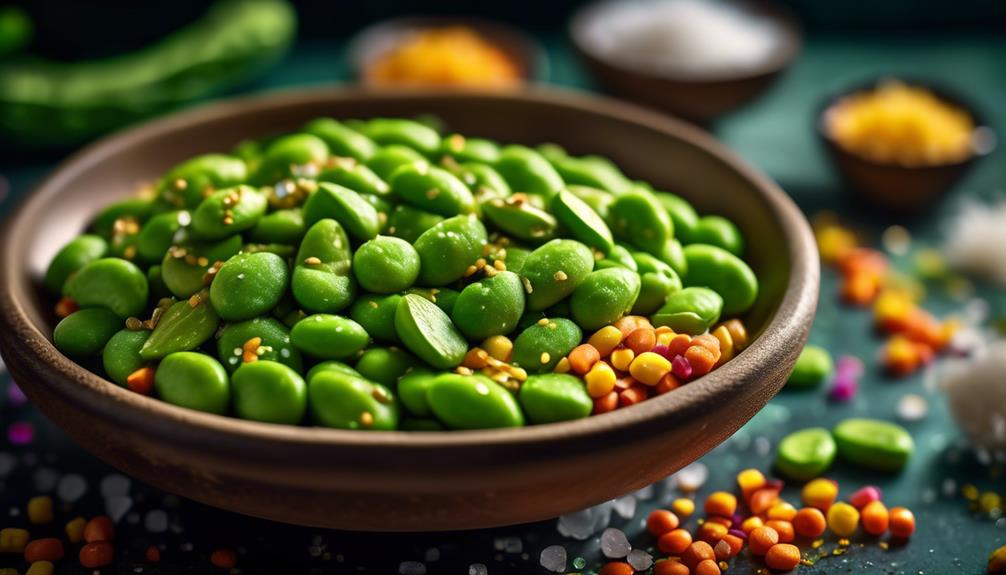
If you're looking for a delicious and nutritious plant-based protein source, edamame offers a satisfying option for your vegetarian keto diet. Here are three reasons why you should consider incorporating edamame into your meals:
- Edamame benefits: Edamame is packed with essential nutrients that can support your overall health. It's an excellent source of protein, providing all the essential amino acids your body needs. It's also rich in fiber, which can aid in digestion and help you feel fuller for longer. Additionally, edamame contains important vitamins and minerals, such as vitamin C, vitamin K, folate, and iron.
- Versatile ingredient: Edamame can be used in a variety of recipes, making it a versatile addition to your vegetarian keto meals. You can enjoy it steamed and lightly salted as a snack, or add it to salads, stir-fries, and soups for an extra boost of protein. You can also blend it into a creamy dip or spread, or even use it as a substitute for other high-carb ingredients like rice or pasta.
- Low in net carbs: For those following a vegetarian keto diet, edamame is a great choice as it's low in net carbs. Net carbs are calculated by subtracting the fiber content from the total carbohydrates, giving you a better idea of the carbs that impact your blood sugar levels. Edamame is relatively low in net carbs, making it suitable for a keto lifestyle.
Incorporating edamame into your vegetarian keto diet can provide you with a nutritious and satisfying source of plant-based protein. Experiment with different recipes and enjoy the benefits of this versatile ingredient.
Greek Yogurt
Greek yogurt is a creamy and nutritious option to add to your vegetarian keto diet. It's packed with protein, making it an excellent choice for those looking to increase their protein intake while following a plant-based diet. With its smooth and rich texture, Greek yogurt can be enjoyed on its own or used as a base for various dishes.
One of the benefits of Greek yogurt is its high protein content. A 6-ounce serving can provide around 17 grams of protein, which is essential for muscle growth and repair. Protein is also known to help keep you feeling full and satisfied, making Greek yogurt a great option for those on a keto diet.
In addition to protein, Greek yogurt is also a good source of calcium, which is important for maintaining strong bones and teeth. It also contains beneficial probiotics that support gut health and digestion.
If you're following a vegetarian keto diet, you can incorporate Greek yogurt into your meals in various ways. You can enjoy it as a snack, mix it with berries and nuts for a quick and filling breakfast, or use it as a base for smoothies and dressings.
Conclusion
In conclusion, there are various plant-based protein sources that are suitable for a vegetarian keto diet. Tofu, tempeh, seitan, lentils, chickpeas, spirulina, nutritional yeast, edamame, and Greek yogurt are all excellent options.
Interestingly, lentils are particularly noteworthy as they provide an impressive 18 grams of protein per cooked cup.
Incorporating these protein-rich foods into your diet can help ensure you meet your nutritional needs while following a vegetarian keto lifestyle.

